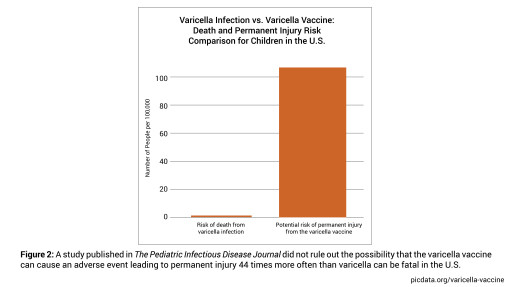
Chicken Pox Infection vs. Varicella Vaccine
Death and Permanent Injury Risk Comparison for Children in the U.S.
NEWPORT BEACH, Calif., October 27, 2023 (Newswire.com) - Physicians for Informed Consent (PIC) has introduced two new educational documents, “Varicella (Chicken Pox): What Parents Need to Know” and “Varicella Vaccine: Is It Safer Than Chicken Pox?” The educational materials include key scientific data on the risks of chicken pox as well as the risks of the varicella vaccine, assisting parents in making a more informed risk-benefit calculation for vaccination.
“Now, more than ever, parents are motivated to learn more about the risks of childhood infections and their respective vaccines — and they want to know the numbers,” said Dr. Shira Miller, founder and president of Physicians for Informed Consent. "Although many parents remember from experience that chicken pox is generally benign, as the chicken pox vaccine is required for childcare and school attendance in all states, and with no religious or personal belief exemption in five states, including California, we’re pleased to now make available for free a Disease Information Statement and Vaccine Risk Statement for chicken pox."
Important facts from the Varicella (Chicken Pox) Disease Information Statement (DIS) are as follows:
- More than 96% of new varicella infections are benign (1) and not reported to public health departments.
- Fatal cases of varicella are rare in the United States. Before the introduction of the varicella vaccination program, one in 40,000 or 0.003% of varicella cases were fatal.
- Because varicella resolves on its own in almost all cases, usually only rest and hydration are necessary.
- Immune globulin is available to treat immunocompromised patients who are exposed to chicken pox, such as those on chemotherapy.
Key facts from the Varicella (Chicken Pox) Vaccine Risk Statement (VRS) are as follows:
- The Centers for Disease Control and Prevention (CDC) states, “It is not known how long a vaccinated person is protected against varicella.”
- The Institute of Medicine has not ruled out the possibility that varicella vaccination can lead to stroke as well as several neurological and autoimmune disorders, including encephalopathy, cerebellar ataxia, transverse myelitis, Guillain-Barré syndrome, small fiber neuropathy, arthropathy, and thrombocytopenia.
- A study published in The Pediatric Infectious Disease Journal shows the varicella vaccine may cause permanent injury 44 times more often than fatal varicella.
- The chicken pox (varicella) vaccine has not been proven safer than chicken pox.
To safeguard children’s health, parents need access to balanced educational information on infectious diseases and vaccines. PIC makes scientific data freely available through its education program, a growing collection of concise, reader-friendly educational materials that support parents, physicians, and policymakers in calculating the risk-benefit ratio of vaccination. To read the newest DIS and VRS documents on chicken pox and the varicella vaccine, visit physiciansforinformedconsent.org/varicella.
(1) Centers for Disease Control and Prevention. Epidemiology and prevention of vaccine-preventable diseases. 13th ed. Hamborsky J, Kroger A, Wolfe S, editors. Washington, D.C.: Public Health Foundation; 2015. 359, Appendix E5. https://physiciansforinformedconsent.org/cdc-pink-book-13th-
edition-and-appendix-e-2015-combo; "in the early 1990s, annually there were about 4 million cases, of which about 150,000 (3.75%) were reported."
Greg Glaser
General Counsel
[email protected]
925-642-6651
Original Source: Physicians for Informed Consent States, 'Chicken Pox (Varicella) Vaccine Has Not Been Proven Safer Than Chicken Pox'